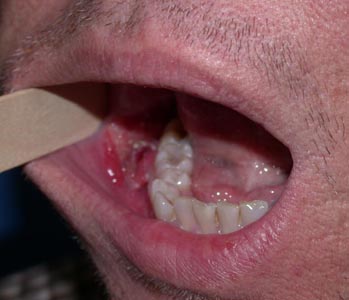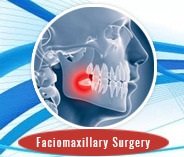Oral cancer can form in any part of the mouth or throat. Most oral cancers begin in the tongue and in the floor of the mouth. Anyone can get oral cancer, but the risk is higher if you are male, over age 40, use tobacco or alcohol or have a history of head or neck cancer. Frequent sun exposure is also a risk for lip cancer.

Symptoms of Mouth Cancer
Signs of mouth cancer include:
- White or red patches in your mouth
- A mouth sore that won’t heal
- Bleeding in your mouth
- Loose teeth
- Problems or pain with swallowing
- A lump in your neck
- An earache
Oral cancer treatments may include surgery, radiation therapy or chemotherapy. Some patients need a combination of treatments.
Causes of Mouth Cancer
A number of factors may contribute to the development of oral cancer. The most common are the use of tobacco and alcohol. Others include poor oral hygiene, irritation caused by ill-fitting dentures and rough surfaces on teeth, poor nutrition, some chronic infections and combinations of these factors. Those at an especially high risk of developing oral cancer are over 40 years of age, heavy drinkers and smokers, or users of smokeless tobacco, including snuff.
Mouth Cancer Treatment – Types of Surgery
Most people with oral cancer have to undergo some type of surgery. If you have a large tumour in your mouth, you may have other treatment before oral cancer surgery. That treatment may be chemotherapy alone, or in addition to radiation therapy. The goal of these other treatments is to help shrink the tumour and make it easier to remove. Receiving another type of treatment before surgery is called neoadjuvant therapy. The type of surgery you have depends on your health condition and stage of the tumour. The doctor may remove part or all of the affected area of the oral cavity.
Regardless of the type, on the day of your surgery, you’ll get anaesthesia so that you don’t feel pain. Before the surgery, you can ask your oral surgeon questions about the anaesthesia and how it will affect you.
An Oral and Maxillofacial Surgeon will explain your surgical options. The list below gives you a general idea of the types of surgery you might hear about:
- Primary tumor resection: This surgery involves removing the tissue in your mouth that contains the cancer (mouth surgery), along with a little of the normal tissue surrounding the tumour. If your surgical team removes a large amount of tissue, they may use reconstruction techniques to rebuild the area. Doctors do this by taking normal tissue from another part of your body.
- Partial mandible resection: If the cancer involves your jawbone (also called the mandible), your surgeon may remove part of the bone (jaw surgery). Sometimes the jawbone is rebuilt with bone from another part of your body, or by inserting a metal plate.
- Maxillectomy: If the cancer involves the bone in your mouth that holds your upper teeth (called the maxilla), your surgeon may remove part of the bone. You may receive prosthesis, which is a special device that fits into the roof of your mouth.
- Mohs’ micrographic surgery: If the cancer is in your lip, your surgeon might use this special technique to remove the cancer. Its goal is to help preserve your lip’s appearance. The surgeon shaves off layers of skin one layer at time. Each layer is examined under the microscope to identify any cancerous cells. When your surgeon finds no more cancerous cells, then no more layers of skin are removed.
- Neck dissection: This surgery can be done if there is a chance the cancer has spread to the throat and lymph nodes in your neck (throat cancer surgery). Your surgeon removes the lymph nodes in the neck and some surrounding tissue.
- Tracheostomy: You may have this surgery if the cancer or surgery makes breathing difficult. The surgeon makes a hole in your neck, into your trachea, and holds it open with a small tube, called a trach tube. You then breathe through this tube.
Many of the surgeries for oral cancer may affect your appearance or make it difficult to use your mouth. You may need more surgery to rebuild your mouth. This is called reconstructive surgery. Your surgeon may do this right after the tumour is removed. Or it may be done as a separate surgery.
Mouth Cancer treatment in India
Oral cancer is the most common form of cancer in India accounting for 50% of all cases of cancer in India. As much as 7% of all cancer deaths in males and 4% in females have been reported to be due to oral cancer. These high figures can be attributed to smoking, chewing tobacco and alcohol use.
Cosmozone offers advanced oral cancer treatment by one of the best Oral and Maxillofacial Surgeons. Doctors here consider each patient’s type and extent of Oral Cancer to recommend the most appropriate treatment plan. They also carefully consider and select the treatment option that will allow the patient to maintain good quality of life with good survival rate. Functions like swallowing and speech which are important for survival and communication is taken care of with control of cancer at a very early stage itself.















